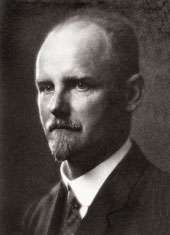Jānis Bērziņš-Ziemelis

Jan Berzin or Jānis Bērziņš-Ziemelis (11 October 1881 – 29 August 1938) was a Latvian revolutionary, journalist and diplomat. He was Ambassador of the Soviet Union to Austria between 1925 and 1927. He was killed during the Great Purge and rehabilitated in 1956.
Life
Berzin was born into a Latvian peasant family[1] in the Russian Empire. He completed the pedagogical seminar, and then worked as a teacher. He became a member of the Russian Social Democratic Labour Party (RSDLP) in 1902, and was repeatedly arrested and exiled. From 1906 to 1907 he was secretary of the RSDLP committee of St. Petersburg, and in 1907 he was delegate of the 5th Congress of the Russian Social Democratic Labour Party.
Under the pseudonym "Winter," Berzin took part in the Zimmerwald conference (1915)[1] for the Social-Democracy of the Lettish Territory, a territorial organisation of the RSLP. As a member of this organisation, Berzin published its organ Proletariāta cīņa (Proletarian Struggle); later he became a journalist in the USA. In 1917, at the 6th Congress of the Russian Social Democratic Labour Party (Bolsheviks), he became a full member of the Central Committee. As such, he represented committee at the Second All-Russian Soviet Congress during the October Revolution.
From May to November 1918, he led the political delegation of the Bolsheviks in Switzerland, which was, alongside Sweden, one of the first countries that recognized the Soviet Republic. However, on 12 November 1918, the Soviet mission was expelled from the area by the Swiss Federal Council on charges of espionage and revolutionary actions. This led to a break of relations between Moscow and Bern.[1] From January to May 1919 he belonged to the short-lived Latvian Socialist Soviet Republic as the People's Commissar for Education.[1] He served until June 1920 as secretary of the Executive Committee of the Communist International (ECCI).[1] He was involved in the Treaty of Tartu in 1920. After resigning from his position at the Communist International, Berzin was repeatedly sent as ambassador to the European countries. He represented the interests of Soviet Russia in Finland from February 1921 onwards. In the same year, he became Deputy Head of the Diplomatic Mission in the UK. In June 1925 he became the successor of Adolf Joffe, the representative of the Soviet Union in Austria. In 1927 he was replaced by Konstantin Yurenev.
Subsequently, he became Plenipotentiary of the Committee of Foreign Affairs of the People's Commissars of the Ukrainian SSR and a member of the Central Committee of the Communist Party of Ukraine. From 1929 to 1932 he was deputy head of the Commission for the publication of diplomatic documents. From 1932 he headed the Central Archive Administration of the USSR[1] and was editor of the magazine "Red Archive". In December 1937 he was arrested during the Great Terror on charges of conspiring with "imperial forces" against the Soviet Union. Berzin died in the Gulag the following year. He was rehabilitated in 1956, during the Khrushchev Thaw.
References
Bibliography
- Branko M. Lazić, Milorad M. Drachkovitch: Biographical Dictionary of the Comintern, Hoover Press, 1986, pp.27–28.